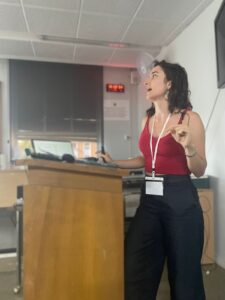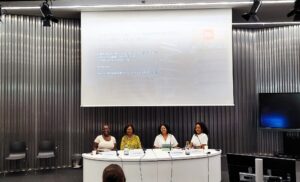Feb. 27, 2026
Interview with Agata Ignaciuk on Radio France Internationale (RFI) about the European fund to finance safe abortions
Agata Ignaciuk: ‘It’s a measure that will alleviate costs […] but it’s a band-aid solution.’
25 February 2026 marked a formal milestone in the European debate on reproductive rights. The European Commission announced that Member States can use the European Social Fund Plus (ESF+) to finance cross-border access to safe abortion. 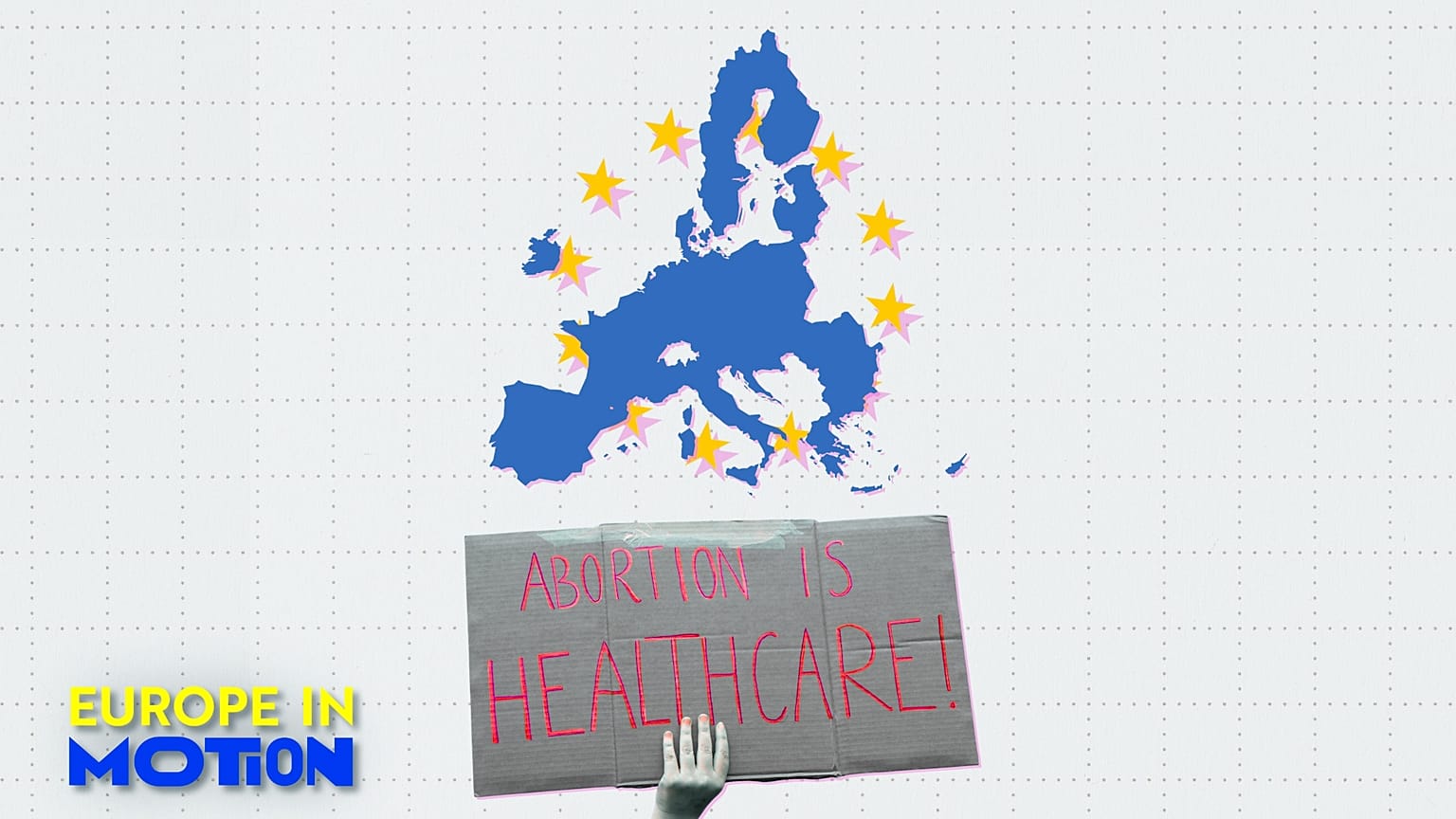 However, Dr Agata Ignaciuk, cultural historian of reproductive health and co-principal investigator of the LEGABO project at the University of Granada, was blunt in her interview with Radio France Internationale: the decision is, at best, a band-aid solution. It alleviates symptoms, but does not address the structural causes of reproductive inequality in Europe.
However, Dr Agata Ignaciuk, cultural historian of reproductive health and co-principal investigator of the LEGABO project at the University of Granada, was blunt in her interview with Radio France Internationale: the decision is, at best, a band-aid solution. It alleviates symptoms, but does not address the structural causes of reproductive inequality in Europe.
For Ignaciuk, the underlying problem is not financial, but political and legislative. More than 20 million women in the EU do not have access to safe and legal voluntary termination of pregnancy in their own country. As long as some Member States maintain deeply restrictive legislation — such as Poland and Malta, where women have been crossing borders for years to have abortions — the possibility of using European funds to cover the cost of travel does not resolve the inequality. In her analysis, paying for ‘abortion tourism’ is not emancipation; it is the normalisation of a system in which the poorest women will continue to be excluded, as even access to these funds does not guarantee the actual logistics of the trip, the free time or the social support necessary.
The Commission’s decision responds to the European citizens’ initiative ‘My voice, my choice’, which gathered more than 1,124,513 signatures. In December 2025, the European Parliament had already approved a non-binding resolution in favour of a solidarity-based funding mechanism, with 358 votes in favour. But the fact that the institutional response has been to allow the use of existing funds, rather than creating a new and specific instrument with clear obligations for Member States, is for Ignaciuk a clear sign that Brussels is not willing to bear the political cost of confronting the bloc’s more conservative governments.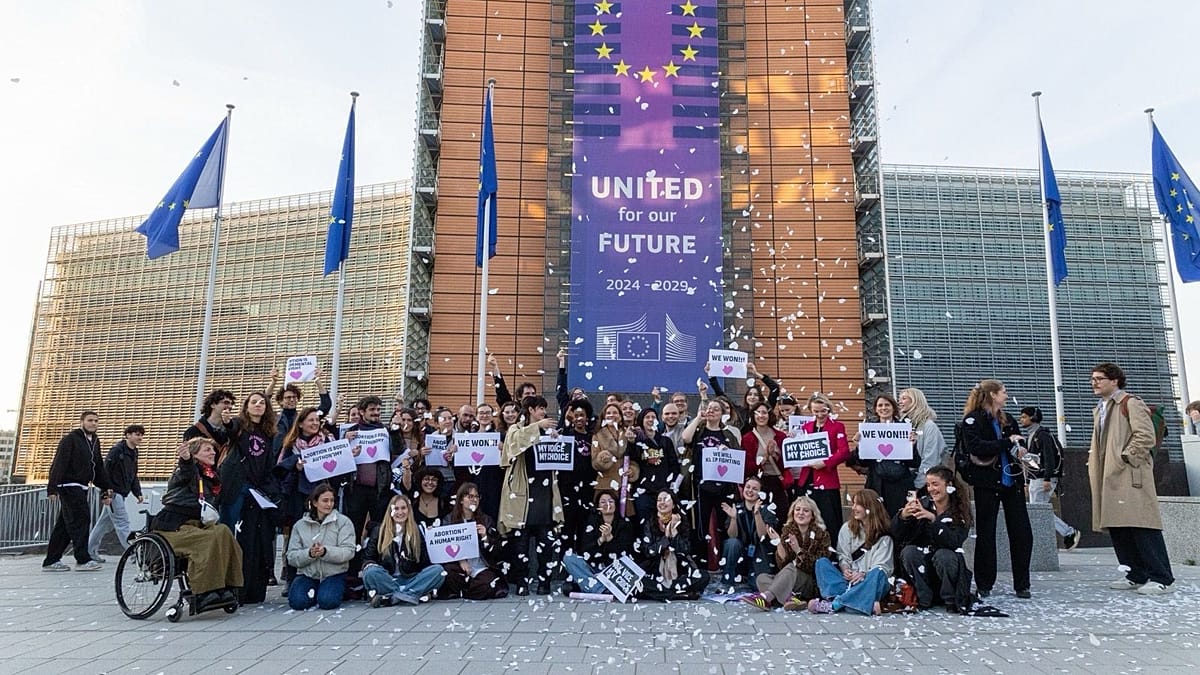
The real urgency, the researcher argues, would be to move towards a European directive that minimally harmonises access to abortion in all Member States. From this position, her diagnosis is that of an incomplete reform: patches sometimes consolidate the problem they are intended to solve.
Listen to the interview by clicking ➡️ here.
Sources:
- https://citizens-initiative.europa.eu/my-voice-my-choice-safe-and-accessible-abortion_es
- https://www.europarl.europa.eu/news/es/press-room/20251211IPR32167/mi-voz-mi-decision-el-pe-apoya-la-iniciativa-sobre-aborto-accesible
- https://www.lavanguardia.com/vida/20260226/11476334/bruselas-cierra-puerta-fondo-europeo-blindar-acceso-aborto.html
- https://es.euronews.com/my-europe/2026/02/26/la-ue-estados-miembros-usar-fondo-social-para-acceso-transfronterizo-aborto
Feb. 5/6, 2026
Workshop “Reproductive Healthcare Providers across Europe, 19th–20th Centuries”

On 5 and 6 February 2026, our project hosted the workshop ‘Reproductive Healthcare Providers across Europe, 19th–20th Centuries’ at the University of Granada’, two intense days of debate dedicated to those who, in different historical contexts, provided reproductive healthcare in Europe. The initiative was jointly organised by the University of Granada and the COST EuroHealthHist Action, bringing together scholars from several European countries.
The workshop was made possible thanks to the work of the scientific committee composed of Agata Ignaciuk, Yuliya Hilevych, Despo Kritsotaki and Mara Mundi-López, and the local organising committee formed by Agata Ignaciuk, Mara Mundi-López, Elisa Roncone and Montse Alcaina. Led by this group of organisers, the workshop aimed to explore and critically question the category of ‘reproductive health service provider’, interrogating the multiple figures who have offered services and expertise in this field over time. The presentations, organised in a hybrid format, addressed the histories of midwives, surgeons, general practitioners and family doctors, gynaecologists, counsellors, nursing staff, but also empirical, alternative and activist practices.
 The sessions were structured around three thematic lines, designed to reflect the complexity of a rapidly expanding field of research and to foster an intense dialogue between local and transnational perspectives. The training and institutionalisation of health professions, the production of knowledge and protocols, professional practices and forms of activism, both by recognised experts and non-professionals, were discussed. Special attention was paid to the relationships between and within professional groups, the dynamics between patients and providers, and the different structures of public, private, voluntary and charitable healthcare.
The sessions were structured around three thematic lines, designed to reflect the complexity of a rapidly expanding field of research and to foster an intense dialogue between local and transnational perspectives. The training and institutionalisation of health professions, the production of knowledge and protocols, professional practices and forms of activism, both by recognised experts and non-professionals, were discussed. Special attention was paid to the relationships between and within professional groups, the dynamics between patients and providers, and the different structures of public, private, voluntary and charitable healthcare.
The workshop broadened the perspective on the history of reproductive health through the analysis of healthcare spaces and objects: clinics, hospitals, private homes, instruments and technologies that have enabled—and sometimes limited—access to services.
Despite the weather warnings that affected southern Spain during those days, the workshop proved to be a very fruitful moment, confirming the importance of creating meeting spaces to reflect historically on reproductive health services and those who have guaranteed them.

Feb. 2/4, 2026
Training School “Rethinking Healthcare Providers and Patients”
From 2 to 4 February 2026, the University of Granada hosted the training school ‘Rethinking healthcare providers and patients: lived experiences, social relations and agency in the 20th and 21st centuries’, organised within the framework of the COST EuroHealthHist Action. The Training School was co-organised by Working Group 2 (Yuliya Hilevych, Agata Ignaciuk) and Working Group 3 (Friederike Kind-Kovács, José Luis Aguilar López-Barajas), in close collaboration with the local committee in Granada. The event brought together young researchers from different countries and disciplines with the aim of rethinking the history of healthcare through lived experiences, social relations and forms of agency of providers and patients in the 20th and 21st centuries.
The Training School adopted a multidisciplinary perspective, intertwining history, social sciences and medical studies to examine the interaction between healthcare professionals, healthcare practices and people receiving care in different historical and geographical contexts. Using case studies spanning the ‘long 20th century,’ participants analysed how changes in ideas about health, professionalisation, the bureaucratisation of healthcare systems, and forms of health citizenship have transformed the ways in which care is provided and received.
At the heart of the training programme was the broad notion of provider and patient agency, used as a lens to question how people have negotiated, challenged, or reinvented healthcare structures, even in authoritarian or highly centralised contexts. The activities combined theoretical and methodological workshops, individual and collective writing sessions, personalised tutorials, and opportunities to present and discuss work in progress, based on primary sources provided by the participants.
A distinctive feature of the Training School was the care taken to create a truly horizontal and welcoming space, capable of making even those participating for the first time in an international context of this kind feel comfortable. Shared reflection helped to gradually dismantle performance anxieties, showing how knowledge construction can also take place outside of more rigid academic models, through practices of mutual listening, care, and collaboration.
For many academics at the beginning of their careers, the Training School has represented not only an opportunity for intellectual growth, but also an experience of community: a place to experiment with different ways of writing health history, focusing on the lives and voices of those who, in the past and present, have inhabited healthcare systems as patients, as professionals, or in both positions.
Nov. 13/14, 2025
Agata Ignaciuk at the international workshop “Natality and Fecundity Decline: The Reproductive Justice Challenge”

Professor Agata Ignaciuk, representing the LEGABO team, participated in the international workshop ‘Natality and Fecundity Decline: The Reproductive Justice Challenge’ held at the École des Hautes Études en Sciences Sociales (EHESS) in Paris on 13-14 November 2025. The event marked the launch of the CNRS research network ‘FERJUST’ (Fertility Justice Challenge), of which she is a member.
Oct. 14, 2025
Maud Bracke (University of Glasgow) visits the LEGABO project
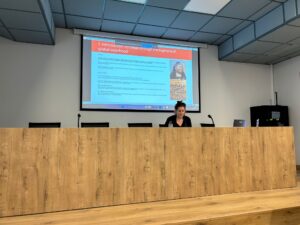
On 14 October 2025, the Scientific Documentation Centre at the University of Granada welcomed historian Maud Bracke, professor of history at the University of Glasgow and specialist in the history of contemporary European feminism and women’s health and reproductive rights movements.

During her visit, Bracke gave a lecture entitled A kaleidoscope of struggles: Connections, conflicts and intersections in the global women’s health movement and the debates on reproductive rights (1970s–80s), as part of the Shared Feminist Conversations series,
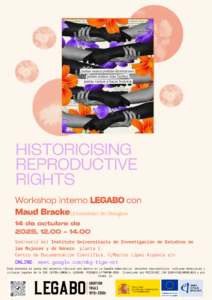
organised in collaboration with Professor Agata Ignaciuk (Department of Pathological Anatomy and History of Science).
The day continued with the LEGABO project’s internal workshop, Historicising Reproductive Rights, where the group’s pre-doctoral researchers presented their work in progress, sharing methodologies, questions and challenges related to the history of abortion in Spain, sexual and reproductive health and reproductive justice.
The meeting provided a space for dialogue and collective learning, leaving a deep inspiration to continue reflecting on the transnational connections and political tensions that run through the history of reproductive rights.
Oct. 4, 2025
Dismantling Post-Abortion Syndrome: Agata Ignaciuk’s Historical Perspectives on Gender and Health

In the context of the history of reproductive rights, the article ‘The 1970s and the origin of “post-abortion syndrome”: how to convince women that they will regret having an abortion’ explores the roots of anti-abortion activism in the United States during the 1970s, a period marked by the Roe v. Wade ruling and the advancement of female autonomy. Written by Noemí López Trujillo and published on 4 October 2025 in Newtral, the text highlights how pseudoscientific narratives, inspired by male anxieties about women’s labour and sexual emancipation, promoted the myth of ‘post-abortion syndrome’ to delegitimise the right to abortion. In it, Dr. Agata Ignaciuk, an expert in reproductive health, analyses how these discourses, disseminated in ‘pregnancy help’ centres, distorted medical evidence to instil fear and stigma, linking abortion to supposed psychological risks and non-existent sterility. This analysis is essential to understanding historical strategies against women’s liberation and their echo in contemporary debates on reproductive justice.
⚪ Link to article ⚪
Sept. 30, 2025

Agata Ignaciuk, cultural historian of reproductive health, medicine and rights, will be the keynote speaker at the upcoming INEDYTO Bioethics Seminar with her talk ‘The social and cultural history of legal abortion’. This is a valuable opportunity to learn about the historical and cultural debates that have shaped reproductive rights in contemporary contexts.
Sept. 28, 2025
28S – Global Day of Action for Access to Safe, Legal, and Accessible Abortion
Every year, on September 28, social media becomes a space for collective action. The hashtag #September28 brings together a transnational community demanding the right to safe and free abortion. Digital campaigns do more than spread messages—they produce feminist knowledge by making visible experiences, resistances, and structural inequalities. According to Ipas (2025), organizations participating in the Global Day of Action for Access to Safe and Legal Abortion have helped reinforce the institutional recognition of abortion as an essential component of public health and human rights (ASAP, 2025; Center for Reproductive Rights, 2025).
In Spain, feminist activists in Madrid organized a demonstration in front of the Ministry of Health to denounce the gap between legal rights and actual access to voluntary pregnancy termination. Although Organic Law 1/2023 guarantees this right, the data show severe territorial inequality: only 78 of more than 21,000 abortions performed in 2024 took place within Madrid’s public health system (El Salto, 2025). Anti-racist collectives also emphasized that discussing abortion necessarily involves challenging institutional racism and healthcare exclusion, which disproportionately affect migrant women and people without health coverage (El Salto, 2025).
A few days later, Prime Minister Pedro Sánchez announced the government’s intention to amend the Constitution to enshrine the right to abortion, placing Spain among the first countries in the world to do so (Infolibre, 2025). The proposal responded to a motion promoted by Vox and the Popular Party in the Madrid City Council, which sought to include information on the nonexistent “post-abortion syndrome,” a concept without scientific basis historically used to blame women who terminate pregnancies (Newtral, 2025).
The European Parliament officially recognized September 28 as International Safe Abortion Day, highlighting the need for intergenerational and transnational cooperation to counter misinformation and the resurgence of anti-abortion movements (European Parliament, 2025).
A Small Political Gesture in the University Space
As part of our research project, we decided to intervene symbolically on 28S with a participatory action at the University of Granada. The initiative consisted of two collective posters with the slogan “My Voice, My Body – September 28”, displayed in visible locations at the Faculty of Medicine and the Institute of Women. The idea was to invite the university community to leave phrases or reflections about abortion as a right.
The poster gradually grew with poems, quotes, and historical fragments: Professor Miguel Lorente contributed his own poem. While we were putting it up, the poster started sparking conversation: a cleaning staff member shared her abortion experience, and a member of the administrative staff commented that it was good to have this topic discussed. Two days later, the poster disappeared. We put it back. It disappeared again. And we put it up once more.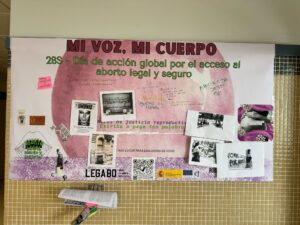
At the Institute of Women, Professor Agata Ignaciuk displayed images from the 1980s related to the pro-abortion struggle. The next day, a note with the message “no al aborto” appeared on the poster. Despite this, several students responded with new phrases and arguments, turning an act of censorship into a political dialogue.
As the members of the Abortion Dream Team remind us:
“We want to talk about abortion without taboos, without drama, without lies, and without fear.”
At the core, this is the stance we share: that abortion should be legal, accessible, and safe.
It should not be seen as a medical exception or a favor from the system, but as a basic right, a decision that belongs to us, a daily practice of autonomy and dignity.
Elisa Roncone
Sept. 3-5, 2025
LEGABO team – 19th Congress of the Spanish Society for the History of Medicine held at the Complutense University of Madrid
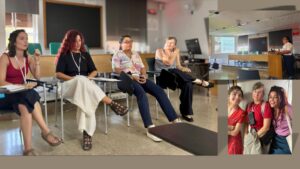
On 3, 4 and 5 September 2025, the LEGABO team participated in the 19th Congress of the Spanish Society for the History of Medicine held in Madrid with a thematic panel entitled Abortion trials and the history of reproductive health.
Agata Ignaciuk presented the objectives, methodology and sources of the project and the case study of the Pamplona trial (1987-1990) in which two female doctors and one male doctor were tried for performing abortions in a public hospital. Elisa Roncone presented a bibliographic review of the history of family planning from the perspective of reproductive justice. María Mundi-López gave a socio-historical overview of trials for self-managed abortion in Spain. The panel concluded with a presentation by Ángela Agudelo-González, who analysed court cases involving abortion, infanticide and abandonment in Colombia during the first half of the 20th century.
Aug. 26-29, 2025
LEGABO – EAHMH 2025 Congress
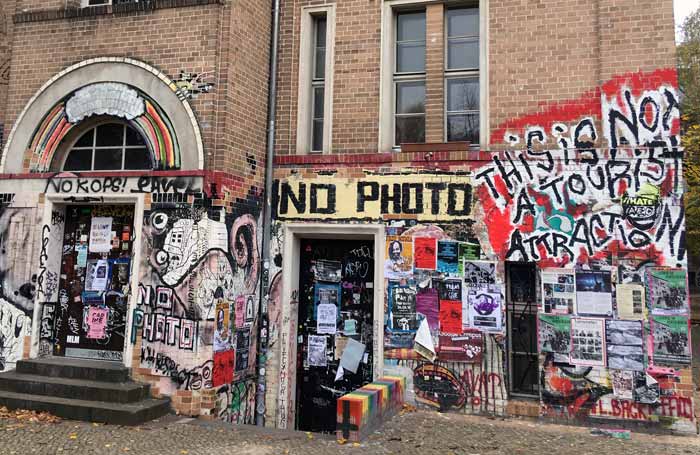
The LEGABO team participates in the European Association for the History of Medicine and Health (EAHMH) conference held in Berlin.
The LEGABO team participated with a thematic panel at the European Association for the History of Medicine and Health (EAHMH: Health Beyond Medicine) conference held in Berlin from 26 to 29 August 2025. Ángela Agudelo-González opened the round table with an analysis of the influence of forensic medicine on trials for abortion, infanticide and abandonment in Colombia in the first half of the 20th century. Agata Ignaciuk and Christabelle Sethna followed with a presentation on trials for abortion against doctors in Spain and Canada in the 1970s and 1980s. For her part, María Mundi-López gave a socio-historiographical overview of self-managed abortion in Spain. Martha Vasili closed the panel with her work on abortion trials in Greece during the 20th century.
Aug. 2, 2025
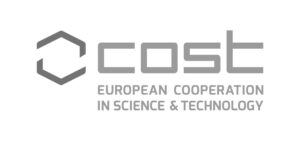
COST Action CA22159 – National, International and Transnational Histories of Healthcare
On 2 August 2025, Agata Ignaciuk and María Mundi-López participated in the meeting of the organising group of COST Action CA22159 – National, International and Transnational Histories of Healthcare, 1850-2000, held in Berlin, where they discussed the activities, funding and work to be carried out in the coming year.

July 23, 2025
Marta Velasco Martín – International Society of for the History, Philosophy, and Social Studies of Biology (ISHPSSB)
 Transmission electron micrograph of Rubella virus virions
Transmission electron micrograph of Rubella virus virions
Marta Velasco Martín at the Biennial Meeting of the International Society for the History, Philosophy, and Social Studies of Biology (ISHPSSB), held in Porto from 20 to 25 July 2025.
On 23 July 2025, Marta Velasco Martín participated virtually in the ISHPSSB PORTO MEETING 2025, speaking in the first part of the double session Microbes and gender, organised by María Jesús Santesmases and Andrea Núñez Casal (CSIC).
In her presentation, entitled ‘Rubella Virus, and Women: Gendered Vulnerabilities and Relationships,’ she spoke about the rubella virus and its role in shaping medical and social discourses on women and their bodies and motherhood in the 20th century from a historical and gender perspective. To this end, she presented part of the process by which the rubella virus became established in the medical community as an infectious and teratogenic agent (from the 1940s onwards), identifying some of the elements that contributed to this process: concepts such as ‘vulnerability’ and ‘risk’, which were used to shape public health research and strategies; industrial and military interests; power hierarchies mediated by gender norms and sexist stereotypes; and the circulation of practical and theoretical knowledge among the scientific community and institutions. She also identified the presence of women—scientists, researchers, doctors, patients, thinkers, activists, historians, etc.—at all stages.
July 3, 2025
🎧 Podcast “40 years since the decriminalisation of abortion in Spain”
To mark the 40th anniversary of the decriminalisation of abortion in Spain, the principal researchers of the LEGABO project —Agata Ignaciuk Klemba (PI) and Lidia Bocanegra Barbecho (co-PI)— took part in the recording of a special podcast episode, alongside:
- Consuelo Catalá, long-standing feminist activist and socialist politician from Valencia, and member of the Expert Committee for the Law on Sexual and Reproductive Rights.
- Enrique Lebrero, gynaecologist from the Acuario health collective, with a long trajectory in sexual and reproductive healthcare.
Through the conversation, it became clear how the 1985 law served as a tool for the normalisation of a practice —abortion— that was already socially accepted and widely performed. This is just one of the many issues addressed in the episode, which brings together historical analysis, testimonies, and experiences linked to the struggles over reproductive rights in Spain.
🎙️ Now available on Historia Digital– Radiolab, the university radio station of the University of Granada and on Spotify
July 3, 2025
40 Years of Legal Abortion in Spain
1985–2025
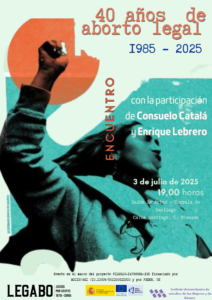
On July 3, 2025, the research project LEGABO (Abortion Trials in Democratic Spain: Reproductive Rights, Material Cultures and Legal Cultures of Abortion (1970s–2000s) ) organized a commemorative colloquium marking the 40th anniversary of the partial decriminalization of abortion in Spain.
We aimed to celebrate the passing of Organic Law 9/1985, which allowed abortion under three specific circumstances, after more than four decades of total prohibition. But it was not only a celebration. We also wanted to listen to the voices of those who fought for that change and to reflect together on what that moment meant—and still means today.
The event was sponsored by the University Institute for Research on Women’s and Gender Studies.
The conversation, moderated by Agata Ignaciuk, was warm, intense, and deeply political. We had the privilege of hearing from Consuelo Catalá, a historic feminist activist from Valencia, who was part of the Commission of Experts that promoted the 1985 reform. We also heard from Enrique Lebrero, a gynecologist from the Acuario health collective, who has been committed since the 1970s to a model of sexual and reproductive care grounded in care, and women’s autonomy.
Their interventions, interwoven with personal stories and political trajectories, gave rise to a vibrant dialogue about the political dimensions of everyday experiences. Topics included childbirth, obstetric violence, networks between self-managed centres and allied professionals, feminist health training, and the crucial role played by the women who staffed family planning centres.
This gathering was not a self-congratulatory celebration, but rather an opportunity to collectively ask what the partial decriminalization of abortion meant—and still means. A shared feeling emerged throughout the evening: what has been achieved is not guaranteed. Legal frameworks alone do not ensure effective access or real autonomy. What lies ahead could, in some respects, be a step backward.
In this sense, the exchange became a collective act of political memory. A space from which to rethink the history of decriminalization not as a destination, but as part of a broader and ongoing struggle for bodily autonomy. Struggles sustained by women, professionals, activists, and users who, from different places, have built networks, challenged norms, and demanded that sexual and reproductive health be recognized not as a privilege, but as a right.
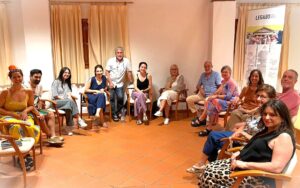
Elisa Roncone
July 1, 2025
Agata Ignaciuk on feminist oral history at the 27th ICHST conference
On 1 July 2025, Agata Ignaciuk took part virtually in the 27th International Congress of History of Science and Technology (online), contributing to Session 1 of the roundtable “Doing Gender: premises, concepts, methods, sources, audiences in history of science, technology and medicine”. The session was sponsored by the Commission on Women and Gender in History of Science, Technology and Medicine.
Her presentation, titled “Feminist oral history of medicine and health. Interviewing Spanish abortion providers,” explored feminist oral history as a methodological approach to research in the field of reproductive health. Drawing on interviews with abortion providers in Spain, Ignaciuk examined how professional memory contributes to shaping historical narratives about abortion access and reproductive rights during and after the country’s democratic transition.
June 25, 2025
Reflections from Geneva
Conference “Race and Sexual and Reproductive Health: Historical Perspectives”
Elisa Roncone, PhD candidate within the LEGABO project, shares her experience at the Race and Sexual and Reproductive Health in Historical Perspectives conference, part of the RE:SHARE project (18–20 June 2025):
It was my first time in Geneva. I arrived early at the Geneva Graduate Institute, wanting to find my bearings, take some photos, to capture an image of what it feels like to begin a PhD. In those first few months, everything feels different: the questions, the fears, the gratitude. And above all, I felt grateful. Grateful for the opportunity, and for the trust of Agata Ignaciuk —my thesis and project supervisor— who encouraged me to join academic spaces alongside Caroline Rusterholz and her team. From the very beginning, the welcome was generous. Naomi Samake-Bäckert and George Severs (both from the Geneva Graduate Institute) integrated me with professionalism and care. I felt I was already part of that small community.
Nicole Bourbonnais’s keynote (The Gospel of Family Planning: An Intimate Global History) became a grounding point. Nicole did not just speak about sources, frameworks, and archives. She began with her grandmother. With the intimate history that led her to research family planning. Hearing her say that “every country has its own Margaret Sanger” was eye-opening. I thought about how many “intimate” histories remain excluded from global narratives because they’re not white enough, because they don’t fit dominant frameworks of visibility.
When she spoke of Adaline Pendleton Satterthwaite, “Penny” —a physician and technical advisor to the Population Council in the 60s and 70s, who travelled the world keeping daily journals— I felt those pages, written from everyday activism, spoke directly to me. Not as a dead archive, but as a living testimony of a transnational feminist genealogy I want to be part of.
The roundtable with Edem Ntumy (Reproductive Justice Initiative), Jenny Douglas (Open University), and Christina Ganotakis (NAZ) was a key moment. They spoke about structural racism, the chronic lack of funding for Black Studies, and the urgent need to build a less white academy. One where Black researchers are not merely objects of analysis, but central voices. They said it with conviction. And it was felt.
I resonated with Roberta Bivins’s (University of Warwick) comment after a panel: “I was so ignorant before this panel started — and now I feel I have learned so much.” That sentence stayed with me throughout the three days of the conference.
Audience interventions were so precise and necessary that I thought: each question deserved to become a research line, a funded project, a collaborative network.
I still carry the question posed to us by Samuel Yosef (King’s College London) and Manna Mostaghim (LSE):
What does reproductive justice mean to you? How does it take shape in your context?
I do not want my thesis to merely represent. I want it to be a tool —among others— to reflect on what a racially just reproductive health could mean, built from the neighbourhood, the consultation room, the archive. In relation.
Because if there is one thing I am taking home from Geneva, it is this:
Reproductive justice is not declared or theorised in isolation — it is practiced through connection.
Between allies in political struggle, between professionals and patients, between movements, generations, and bodies.
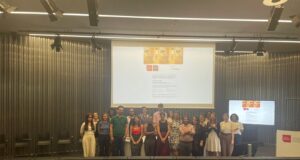
June 10-12, 2025
IV Repromob Conference
Reproductive governance and mobilities in Europe and Latin America: questioning reproductive justice and rights in a context of austerity and fertility decline

On 10–12 June, María Mundi-López attended the IV Repromob Conference – Reproductive governance and mobilities in Europe and Latin America: questioning reproductive justice and rights in a context of austerity and fertility decline, held in Barcelona, Spain. The various panels explored international dynamics of reproductive governance and their impact on reproductive rights and on the movements of people or materialities related to abortion, assisted reproduction, or adoption.
May 16, 2025
Doctoral Thesis Defence
Ángela Lucía Agudelo-González
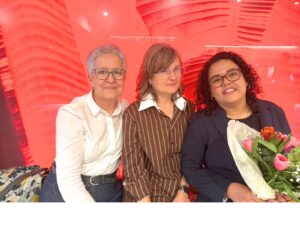
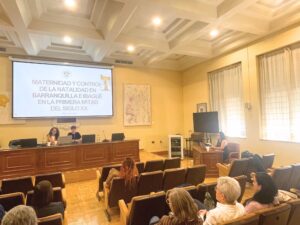
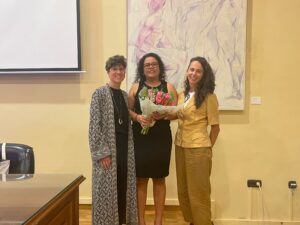
On May 16, 2025, in the graduation hall of the Faculty of Political Science at the University of Granada, Ángela Lucía Agudelo-González defended her doctoral thesis titled “Motherhood and Birth Control in Ibagué and Barranquilla During the First Half of the 20th Century.”
This research examined cases of abortion, infanticide, and abandonment in Colombia during this period, using judicial records as its primary source.
📣Congratulation Ángela!📣
May 16, 2025
Presentation on “The Spanish ‘Pro-Life’ Movement (1985–2000)”, Sorbonne University
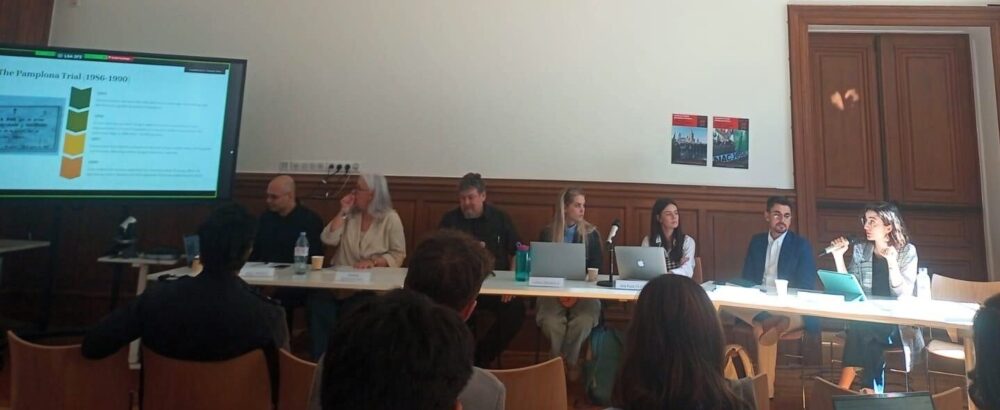
- On May 16, 2025, María Mundi-López and Agata Ignaciuk took part in the event Mobilisations conservatrices: labelliser, contextualiser, enquêter.
There, they presented the paper “Contextualizing the Spanish “Prolife” Movement (1985–2000)”, which explored the early stages of the institutionalisation of the “pro-life” movement in Spain through two case studies. These cases illustrate different strategies used to create both material and symbolic barriers to abortion access during the first partial decriminalisation of abortion in Spain.
May 15, 2025
Shared Feminist Conversations: Christabelle Sethna
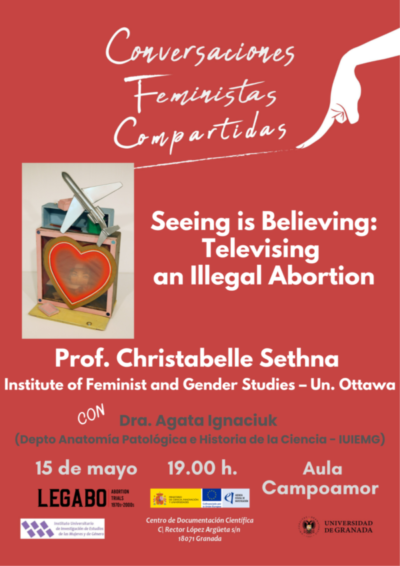
On May 15, 2025, we had the pleasure of hosting a new session of the Shared Feminist Conversations series, featuring Prof. Christabelle Sethna (Institute of Feminist and Gender Studies – University of Ottawa) in dialogue with Dr. Agata Ignaciuk (University of Granada).
The conversation revolved around her research Seeing is Believing: Televising an Illegal Abortion, in which she critically analyses the televised representation of an illegal abortion in 1970s Canada, within a broader context of conservative political strategies and feminist resistance.
It was a deeply thought-provoking talk, not only due to the richness of the content and the rigour of the analysis, but also thanks to the way Prof. Sethna shared the research process itself. Her generous and transparent storytelling turned the session into a space of collective learning, allowing everyone present to gain insight into her modus operandi as a feminist researcher.
May 14, 2025
Agata Ignaciuk on “Hoy por Hoy”: 40 Years of the Abortion Law in Spain
 On May 14, 2025, the programme “Hoy por Hoy” on Cadena SER dedicated a special episode to the 40th anniversary of the 1985 abortion law, which partially decriminalised voluntary termination of pregnancy in Spain.
On May 14, 2025, the programme “Hoy por Hoy” on Cadena SER dedicated a special episode to the 40th anniversary of the 1985 abortion law, which partially decriminalised voluntary termination of pregnancy in Spain.
Among the guest voices, historian Ágata Ignaciuk stood out. She is a researcher specialising in the history of sexual and reproductive rights and health, as well as gender history in Spain and Poland.
Throughout the episode, Ignaciuk offered a rigorous and accessible analysis of the social, medical, and political context surrounding the approval of this law, and its limited impact on the lives of thousands of women in the Spanish state.
As the programme highlighted, the law only legalised abortion in three cases — rape, fetal malformation, and risk to the pregnant woman’s health — leaving out the vast majority of women, who continued to be forced to have abortions in secrecy or to travel abroad if they could afford it.
Her contribution placed these restrictions within the broader framework of institutional violence and the medicalisation of women’s bodies, and helped bring visibility to the feminist struggles that pushed for legal change, as well as to the ongoing resistance.
The episode also features testimonies by Consuelo Catalá, Llum Quiñonero, and Enrique Lebrero.
🎧 You can listen to the full episode here.
May 12, 2025
LEGABO – Doing Research on Abortion
A Morning of Shared Ideas with Christabelle Sethna
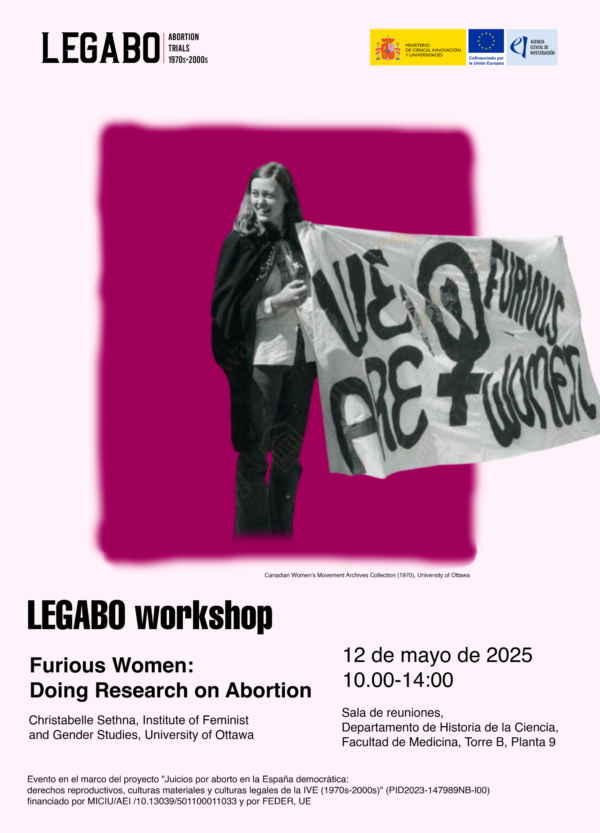
On May 12, 2025, the first workshop of the LEGABO project – Trials for Abortion in Democratic Spain: Reproductive Rights, Material Cultures and Legal Cultures of Abortion (1970s–2000s) – took place. The project is funded by the Spanish Ministry of Science and Innovation and the European Union. The meeting brought together LEGABO researchers, along with invited PhD students and scholars, to share progress, methodologies, and working approaches.
The session centred on the contribution of historian Christabelle Sethna, professor at the Institute of Feminist and Gender Studies at the University of Ottawa and member of the LEGABO team. She presented her current research on the evolution of legal abortion in Canada, the mobility of women seeking access to abortion, and the construction of the archive as a political and affective space.
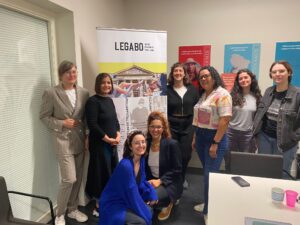 Beyond the richness of the content, the workshop stood out for the warmth, openness, and collaborative tone that shaped the entire day. Sethna not only shared her research but also her way of doing it, sparking methodological and personal reflections on how we engage with our own sources.
Beyond the richness of the content, the workshop stood out for the warmth, openness, and collaborative tone that shaped the entire day. Sethna not only shared her research but also her way of doing it, sparking methodological and personal reflections on how we engage with our own sources.
The atmosphere was especially enriching when PhD students from the Department of History of Science shared their projects, exchanging ideas and feedback in a space of mutual listening and constructive critique.
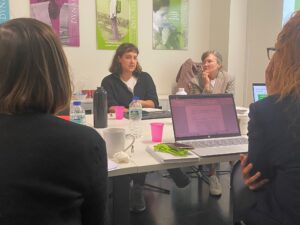
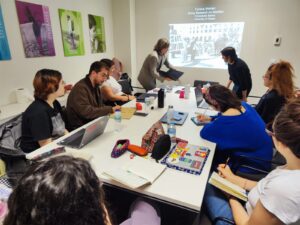
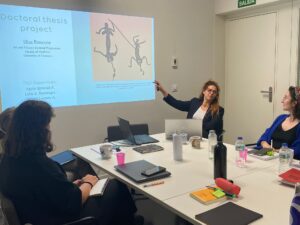
🟣 For a more personal and reflective account of the workshop, you can read Sergio Castro Cortacero’s beautiful piece: Inside the LEGABO Workshop.
April 28–29, 2025
LEGABO Team Participates in the Workshop “Abortion in Europe. History, Policies and Practices”, University of Bergen
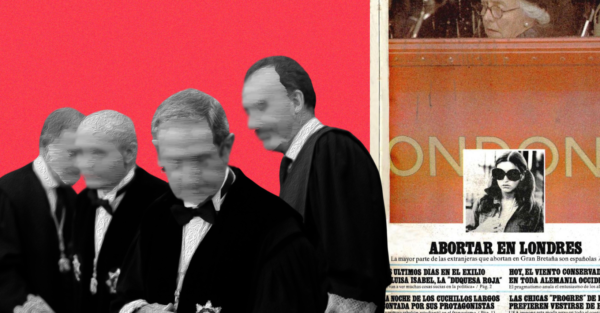
On April 28 and 29, 2025, the research team of the LEGABO project – Trials for Abortion in Democratic Spain: Reproductive Rights, Material Cultures and Legal Cultures of Abortion (1970s–2000s) – took part in the workshop held in Bergen, Norway, as part of a meeting dedicated to the intersections between history, law, and reproductive health.
On this occasion, Agata Ignaciuk presented the project’s historiographical and methodological approach, which focuses on the analysis of court files and high-profile trials as a way to reconstruct the material and legal cultures of abortion in democratic Spain.
The presentation also highlighted LEGABO’s interdisciplinary commitment, combining tools from the cultural history of medicine, gender studies, philosophy of law, and digital humanities to offer an innovative perspective on the history of abortion in Spain.
In the same session, researcher María Mundi-López, also a member of the LEGABO team, presented the paper “Between Access and Technique: History and Controversies of Abortion Policies in Spain (1965–2022)”, in which she traced the historical development of abortion techniques in Spain and their influence on current access inequalities.





